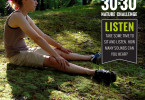Can I just start off by saying that I have hated this week of freezing cold weather! I have even been called a “wuss” for complaining as I have recently moved back from Calgary and am supposed to be used to this freezing weather. When it is this cold out, it is tempting for us to think “Is this global warming thing really so bad? We could get used to some nice temperate winters. What is the harm?”
The flip side of warm winters is that we can experience some hot summers and according to the WHO report, heat waves can seriously affect health – causing heat stress and lead to increased death rates from heart and respiratory failure. This is especially true for those who are more vulnerable like the elderly, chronically-ill, people working in exposed environments and children. People with asthma are more burdened as well because pollen and other aeroallergen levels are also higher in extreme heat.
The report suggests that by the 2050s, heat events that currently occur every 20 years will be experienced on average every 2-5 years. So in 40 years, when I am retired, the world may be one hot summer after another. And to top it off, the report also suggests that by 2050 there will likely be 3 times as many people over the age of 65 living in cities, which probably means that all of the best (and coolest) seniors facilities will be already full.
But we already know that an increasing aging population can put strain on health care as seniors awaiting placement in a home or residential care can often occupy needed beds in crowded hosptials. A recent Hospital News article “Four Priorities to get the Health Care System out of the Emergency Room” indicated that the Canadian Alliance for Sustainable Health Care identified “Aligning the health care system with the needs of an aging population” as a key priority for the Canadian health care system. If you want to read more about the other priorities identified for our health care system see here:
http://www.hospitalnews.com/four-priorities-to-get-the-health-care-system-out-of-the-emergency-room/
Addressing the need for more seniors facilities is one step to mitigate the health impacts of heat waves, another is developing a proactive plan to respond to heat stress issues when a heat wave is predicted. Also long term urban planning strategies include cool roofs that reduce the heat island effect and designing cool zones where people can gather when temperatures are extreme. (Sunnybrook has a few cool roofs already by the way) Lastly by focusing on conserving energy and cutting carbon dioxide emissions we can hope to reduce the intensity of climate change.
Plus reducing carbon emissions can have other health benifits as well. For example, promoting the safe use of public transportation and active movement such as biking or walking as alternatives to using private vechicles can reduce carbon emissions and improve public health. At least I try to remind myself of these goals when I am freezing my toes waiting for the bus.








